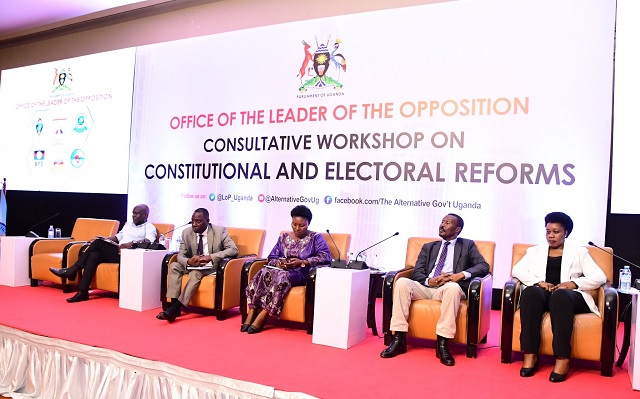
Kampala, Uganda | THE INDEPENDENT | Representatives from opposition political parties, academia, and rights activists have come together to urge Ugandans to exercise their rights in order to bring about much-needed reforms in the electoral laws and the constitution. These observations were made during a two-day consultative meeting held at Speke Resort Munyonyo, which concluded on Friday.
The high-level assembly was organized by the Office of the Leader of Opposition (LOP) in Parliament, led by Mathias Mpuuga. Robert Kyagulanyi Ssentamu, also known as Bobi Wine, the President of the National Unity Platform (NUP) and a former presidential candidate in the 2021 elections, reminded Ugandans that President Yoweri Museveni and his family have usurped the power of the people to rule the country.
Kyagulanyi compared the ruling National Resistance Movement (NRM) party under Museveni to the reign of terror by the late President Idi Amin in 1973. He drew parallels to a military dictatorship that violated human rights, undermined democracy, and compromised state institutions.
Dr. Kiiza Besigye, the former President of the Forum for Democratic Change (FDC) party and a four-time presidential contestant, also spoke at the event. He observed that while power belongs to the citizens, Museveni, and his family have become sovereign, controlling all state institutions.
Dr. Kiiza reminded the country of the “Black Mamba” military attack on the high court in November 2005, where he and 14 other suspects were being tried for treason charges. He also cited the invasion of Parliament by the Special Forces Command (SFC) on September 27, 2017. At that time, the SFC, President Museveni’s elite guard, was headed by his son, Gen Muhoozi Kainerugaba, and they assaulted legislators.
Joe Onyango-Oloka, a Professor of Law at Makerere University, emphasized that Ugandans must confront the legacy of military rule in the country to make constitutional reforms meaningful and beneficial for all those seeking change.
The debate around constitutional reforms in Uganda has been divisive and, at times, violent. In 2019, the Constitution Amendment Bill was introduced by a Member of Parliament, seeking to reinstate presidential term limits, remove army representation from Parliament, and restrict the number of ministers, among other changes. However, the bill expired when the tenure of the 10th Parliament ended.
The proposed reforms included allowing political parties to challenge presidential elections, changing the name of the Uganda Police Force to Uganda Police Service, repealing the office of the Resident District Commissioners (RDC), repealing the office of the Prime Minister, involving the Judicial Service Commission in the appointment of Electoral Commission members, and establishing a panel of Speakers.
Previous attempts by the government to introduce constitutional reforms on land acquisition faced overwhelming opposition, leading to their withdrawal by the Attorney General. The opposition is now calling for extensive citizen sensitization to uphold their rights, as provided for in Article 1 of the Constitution, in order to push the government to accept expedited reforms in the Constitution and electoral laws, thus leveling the political playing field.
They also highlighted that currently, all power rests with President Museveni, who wields this power through the armed forces to deny Ugandans their legitimate rights.
*****
URN
 The Independent Uganda: You get the Truth we Pay the Price
The Independent Uganda: You get the Truth we Pay the Price



